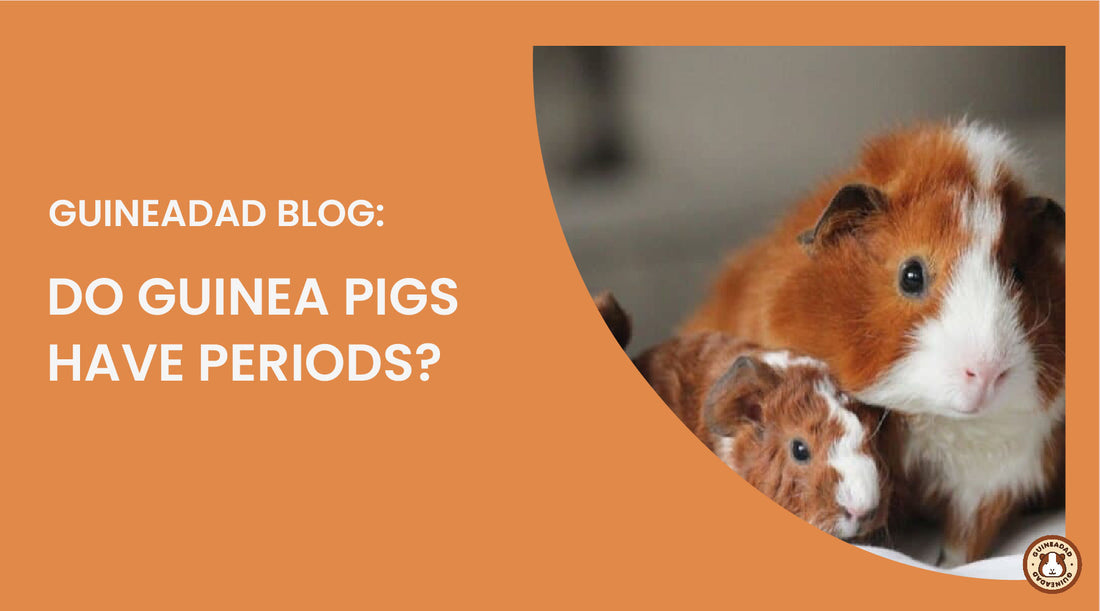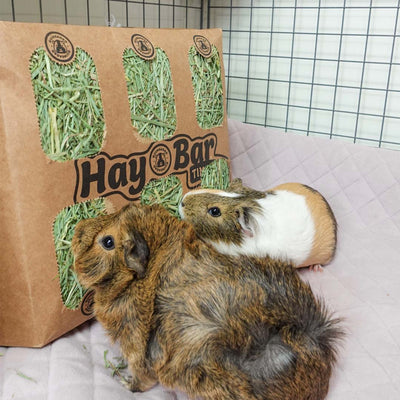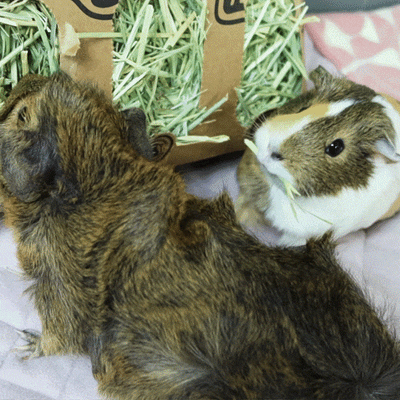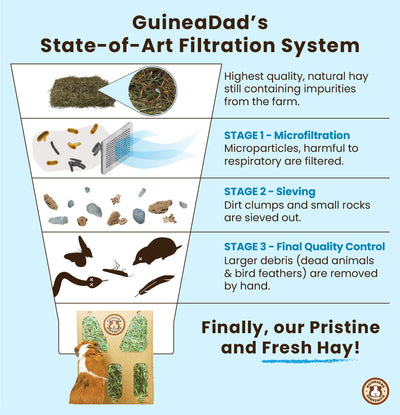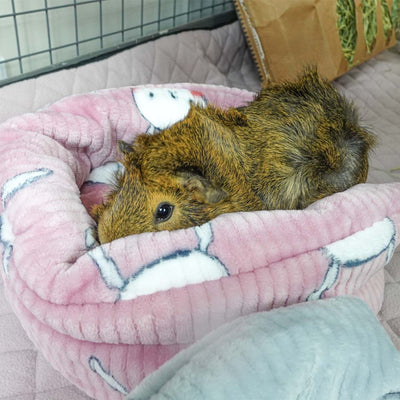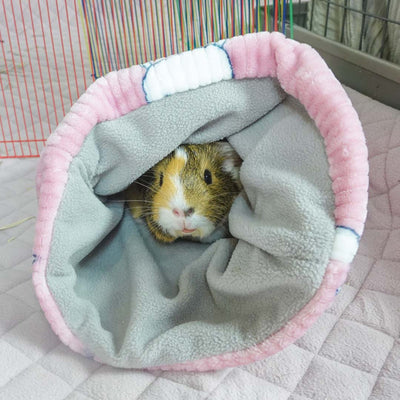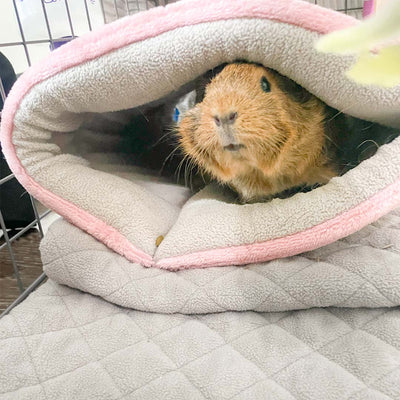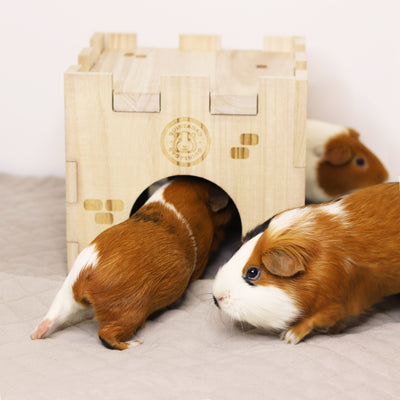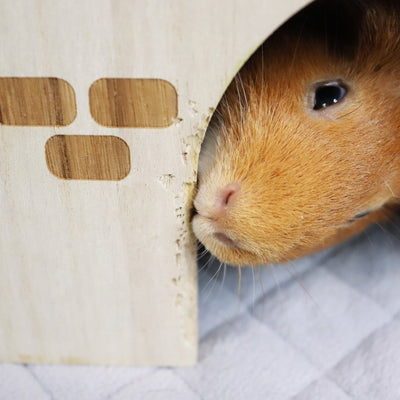If you’ve done your reading on guinea pigs, then you’ll know that guinea pigs can start breeding at a very early age! Typically, female guinea pigs, or sows, are able to breed once they reach the age of two or three months. There’s even cases where sows can become fertile at one month old.
Generally, the best time for guinea pigs to have their first pregnancy is when they’re seven months old because their bodies are equipped with the ability to accommodate the babies and have an easier delivery. As they get older, they’re less able to widen their pelvis for easier deliveries.
You may be wondering, since female guinea pigs are able to breed, then do guinea pigs have their periods? In other words, do female guinea pigs menstruate?
What is menstruation? It’s a process by which mammals that have uteruses will shed the lining and unfertilized eggs. What’s interesting is that unlike most other mammals, guinea pigs do not menstruate during their reproductive cycles! They have a different type of cycle that they go through. With this in mind, if your guinea pig is bleeding, then this can be a sign of some serious medical issues that your guinea pig is experiencing.
Why don’t guinea pigs have periods?
Sows go through something called an estrous cycle instead. Just like all mammals, guinea pigs have a uterus and a reproductive tract, and the uterus has a lining called the endometrium. While sows have a uterus and the endometrium lining like other mammals, it doesn’t function like others! In a menstruation cycle, the lining is shed and bleeds, whereas in a guinea pig the boy will absorb the endometrium without causing any of the bleeding we see in other mammals.
To put it simply, if conception of a baby doesn’t occur, then the guinea pig’s body will simply absorb the endometrium without any bleeding or any other issues. However, sexual activity in sows only occurs when they’re in heat, or their estrus phase.
There are four phases of the estrous cycle, including the proestrus, estrus, metestrus, and the diestrus. The length of the overall cycle depends on the age of the guinea pig, but typically it can last anywhere from 15-17 days, but the estrus, or the hea itself lasts around 24-48 hours.
What is the normal reproductive cycle for guinea pigs?
As mentioned previously, the guinea pig’s overall cycle is 16 days on average, and sows are usually fertile for anywhere from 6-11 hours, and it usually takes place at night! What’s fascinating about sows is that they’re able to begin a new heat cycle within 15 hours of giving birth, and are ready to mate again while nursing the new, existing litter. The heat cycles are most common in the spring, but guinea pigs are known to be able to give birth five times in a year.
The gestation period of guinea pigs can last between 59 and 72 days, and on average the litter will have two to four babies. Sometimes the litters will be larger, but that’s pretty rare!

If guinea pigs don’t get periods, why is my guinea pig bleeding?
If there is bleeding, then this is some cause for concern! This could be a sign of something more serious happening in your guinea pig’s body.
As you probably know, urinary tract infections are pretty common in guinea pigs. One of the main symptoms is their urine output containing blood, which is where you might have mistaken it for menstrual blood. However, the blood doesn’t only appear when your piggy is peeing.
It’s also important to note that male guinea pigs also suffer from UTIs, so it’s not a female-only issue. There are other symptoms of UTIs, including that your guinea pig may show signs of being more thirsty than usual, will pee more as a result of the increased water intake, and they can also possibly show signs of lethargy.
If you notice any of these signs, it’s important that you contact your veterinarian and go in to see them. This is so your vet is able to diagnose your guinea pig and figure out what is wrong, as well as put together an action plan for you and your piggy in order to treat them.
Bladder Stones
Another cause of guinea pig bleeding can be the presence of bladder stones. What are bladder stones? They’re small, crystalized calcium deposits that can appear in your guinea pig’s urine, or it can also form large enough crystals for it to block and clock the urethra.
These bladder stones are caused by the overconsumption of foods containing calcium or too much of generally calcium-rich foods. If it is a case where the urethra is being blocked by a bladder stone, this will make it difficult or even impossible for your guinea pig to urinate.
This can become dangerous and even fatal very quickly, so it’s important that you not only make sure that your guinea pig’s diet is balanced and doesn’t contain too much calcium, but it’s important to keep an eye on their urine output.
The sooner that you’re able to recognize symptoms and changes in your guinea pig's health, the quicker you’ll be able to contact your vet and begin acting on solutions to help your guinea pig.
To determine whether your guinea pig has bladder stones, your veterinarian will use an X-ray and ultrasound in order to examine your guinea pig and identify the stones. If there are an excessive and dangerous amount of stones, your guinea pig may have to get surgery in order to remove them.
This is important because as mentioned before, it can become a fatal issue very quickly. The clog in the urethra is something that more commonly occurs in male guinea pigs, but that doesn’t mean it won’t happen to sows as well!
Pyometra
This is something that occurs in unspayed female cats and dogs, and can also occur in unspayed guinea pigs. This, like excessive bladder stones, can be a potentially fatal disease as well.
This disease isn’t something that can be fought off with antibiotics alone, and it usually requires surgery that is more complex than normal spay procedures.
The symptoms of this disease are a bloated or swollen abdomen, as well as discharge from her vagina. Remember that bloating can also be a symptom of other things, so it’s important whenever you notice any kinds of changes in your guinea pig’s health that you consult your vet as soon as possible.
How to prevent all these things, and how to prevent bleeding
The bleeding that occurs from the conditions that we listed above, there are a few ways that you can prevent them! Sometimes one health issue can lead to secondary health issues and infections, so it’s important that we prevent both from happening in the first place.
One way to easily prevent illness and infection in general is by keeping the cage clean and sanitary. You should be spot cleaning daily, and then cleaning overall at least once a week. This can ensure that your guinea pig’s living environment isn't the culprit behind your guinea pig getting sick.
Make sure that your guinea pig cage bedding is being replaced or cleaned as often as is needed. If you’re using something like paper bedding, make sure to replace it as often as possible. If you’re using reusable bedding like fleece, it’s important that it’s getting washed at least once a week in order to preserve cleanliness and sanitation.
The GuineaDad Liners can help with both these things. They’re super absorbent, while also drying quickly in order to ensure that your guinea pig’s living environment is clean and bacteria free, especially since the fibers they’re made of are designed to inhibit the growth of bacteria.
It’s also important that your guinea pig is eating a balanced diet in order to prevent urinary tract infections from overconsumption of calcium. Make sure that you’re looking into the nutritional facts of everything that you’re feeding your guinea pig and ensuring that they’re not getting too much of any one vitamin or mineral! If you’d like to consult a chart that is quick and easy to read, you can take a look at our Vegetable Master List!
Stay observant of your guinea pigs!
Obviously, guinea pigs aren’t able to tell you whenever they’re sick or not feeling well, so it’s important that you stay vigilant and are always taking notice of any changes in health and behavior! Guinea pig waste output is one of the easiest ways to see whether there is something You, as their piggy parents, are their first line of defense against illness and infection.
As soon as you notice any changes that are concerning, such as the bleeding we’ve discussed, consult your veterinarian. This way they can get to work on diagnosing your guinea pig and getting them the treatment and help that they need in order to be healthy and comfortable again!


